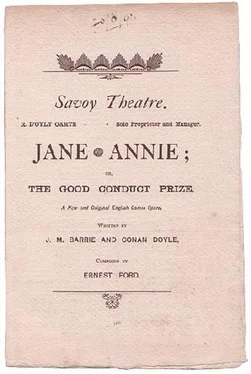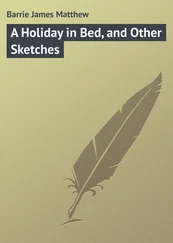James Barrie - Complete Works of J. M. Barrie
Здесь есть возможность читать онлайн «James Barrie - Complete Works of J. M. Barrie» весь текст электронной книги совершенно бесплатно (целиком полную версию без сокращений). В некоторых случаях можно слушать аудио, скачать через торрент в формате fb2 и присутствует краткое содержание. Издательство: Delphi Classics, Жанр: Классическая проза, на английском языке. Описание произведения, (предисловие) а так же отзывы посетителей доступны на портале библиотеки ЛибКат.
- Название:Complete Works of J. M. Barrie
- Автор:
- Издательство:Delphi Classics
- Жанр:
- Год:неизвестен
- ISBN:нет данных
- Рейтинг книги:3 / 5. Голосов: 1
-
Избранное:Добавить в избранное
- Отзывы:
-
Ваша оценка:
- 60
- 1
- 2
- 3
- 4
- 5
Complete Works of J. M. Barrie: краткое содержание, описание и аннотация
Предлагаем к чтению аннотацию, описание, краткое содержание или предисловие (зависит от того, что написал сам автор книги «Complete Works of J. M. Barrie»). Если вы не нашли необходимую информацию о книге — напишите в комментариях, мы постараемся отыскать её.
Peter Pan
Llewelyn Davies boys
Kensington Gardens
Neverland The Little White Bird Peter Pan, or The Boy Who Wouldn't Grow Up Peter Pan
Complete Works of J. M. Barrie — читать онлайн бесплатно полную книгу (весь текст) целиком
Ниже представлен текст книги, разбитый по страницам. Система сохранения места последней прочитанной страницы, позволяет с удобством читать онлайн бесплатно книгу «Complete Works of J. M. Barrie», без необходимости каждый раз заново искать на чём Вы остановились. Поставьте закладку, и сможете в любой момент перейти на страницу, на которой закончили чтение.
Интервал:
Закладка:
The thaw was slow in coming. Snow during the night and several degrees of frost by day were what Thrums began to accept as a revised order of nature. Vainly the Thrums doctor, whose practice extends into the glens, made repeated attempts to reach his distant patients, twice driving so far into the dreary waste that he could neither go on nor turn back. A ploughman who contrived to gallop ten miles for him did not get home for a week. Between the town, which is nowadays an agricultural centre of some importance, and the outlying farms communication was cut off for a month; and I heard subsequently of one farmer who did not see a human being, unconnected with his own farm, for seven weeks. The schoolhouse, which I managed to reach only two days behind time, was closed for a fortnight, and even in Thrums there was only a sprinkling of scholars.
On Sundays the feeling between the different denominations ran high, and the middling good folk who did not go to church counted those who did. In the Established Church there was a sparse gathering, who waited in vain for the minister. After a time it got abroad that a flag of distress was flying from the manse, and then they saw that the minister was storm-stayed. An office-bearer offered to conduct service; but the others present thought they had done their duty and went home. The U. P. bell did not ring at all, and the kirk gates were not opened. The Free Kirk did bravely, however. The attendance in the forenoon amounted to seven, including the minister; but in the afternoon there was a turn-out of upwards of fifty. How much denominational competition had to do with this, none can say; but the general opinion was that this muster to afternoon service was a piece of vainglory. Next Sunday all the kirks were on their mettle, and, though the snow was drifting the whole day, services were general. It was felt that after the action of the Free Kirk the Establisheds and the U. P.’s must show what they too were capable of. So, when the bells rang at eleven o’clock and two, churchgoers began to pour out of every close. If I remember aright, the victory lay with the U. P.’s by two women and a boy. Of course the Auld Lichts mustered in as great force as ever. The other kirks never dreamt of competing with them. What was regarded as a judgment on the Free Kirk for its boastfulness of spirit on the preceding Sunday happened during the forenoon. While the service was taking place a huge clod of snow slipped from the roof and fell right against the church door. It was some time before the prisoners could make up their minds to leave by the windows. What the Auld Lichts would have done in a similar predicament I cannot even conjecture.
That was the first warning of the thaw. It froze again; there was more snow; the thaw began in earnest; and then the streets were a sight to see. There was no traffic to turn the snow to slush, and, where it had not been piled up in walls a few feet from the houses, it remained in the narrow ways till it became a lake. It tried to escape through doorways, when it sank slowly into the floors. Gentle breezes created a ripple on its surface, and strong winds lifted it into the air and flung it against the houses. It undermined the heaps of clotted snow till they tottered like icebergs and fell to pieces. Men made their way through it on stilts. Had a frost followed, the result would have been appalling; but there was no more frost that winter. A fortnight passed before the place looked itself again, and even then congealed snow stood doggedly in the streets, while the country roads were like newly ploughed fields after rain. The heat from large fires soon penetrated through roofs of slate and thatch; and it was quite a common thing for a man to be flattened to the ground by a slithering of snow from above just as he opened his door. But it had seldom more than ten feet to fall. Most interesting of all was the novel sensation experienced as Thrums began to assume its familiar aspect, and objects so long buried that they had been half forgotten came back to view and use.
Storm-stayed shows used to emphasize the severity of a Thrums winter. As the name indicates, these were gatherings of travelling booths in the winter-time. Half a century ago the country was overrun by itinerant showmen, who went their different ways in summer, but formed little colonies in the cold weather, when they pitched their tents in any empty field or disused quarry and huddled together for the sake of warmth: not that they got much of it. Not more than five winters ago we had a storm-stayed show on a small scale; but nowadays the farmers are less willing to give these wanderers a camping-place, and the people are less easily drawn to the entertainments provided, by fife and drum. The colony hung together until it was starved out, when it trailed itself elsewhere. I have often seen it forming. The first arrival would be what was popularly known as “Sam’l Mann’s Tumbling-Booth,” with its tumblers, jugglers, sword-swallowers, and balancers. This travelling show visited us regularly twice a year: once in summer for the Muckle Friday, when the performers were gay and stout, and even the horses had flesh on their bones; and again in the “backend” of the year, when cold and hunger had taken the blood from their faces, and the scraggy dogs that whined at their side were lashed for licking the paint off the caravans. While the storm-stayed show was in the vicinity the villages suffered from an invasion of these dogs. Nothing told more truly the dreadful tale of the showman’s life in winter. Sam’l Mann’s was a big show, and half a dozen smaller ones, most of which were familiar to us, crawled in its wake. Others heard of its whereabouts and came in from distant parts. There was the wellknown Gubbins with his “A’ the World in a Box:” a halfpenny peepshow, in which all the world was represented by Joseph and his Brethren (with pit and coat), the bombardment of Copenhagen, the Battle of the Nile, Daniel in the Den of Lions, and Mount Etna in eruption. “Aunt Maggy’s Whirligig” could be enjoyed on payment of an old pair of boots, a collection of rags, or the like. Besides these and other shows, there were the wandering minstrels, most of whom were “Waterloo veterans” wanting arms or a leg. I remember one whose arms had been “smashed by a thunderbolt at Jamaica.” Queer bent old dames, who superintended “lucky bags” or told fortunes, supplied the uncanny element, but hesitated to call themselves witches, for there can still be seen near Thrums the pool where these unfortunates used to be drowned, and in the session book of the Glen Quharity kirk can be read an old minute announcing that on a certain Sabbath there was no preaching because “the minister was away at the burning of a witch.” To the storm-stayed shows came the gypsies in great numbers. Claypots (which is a corruption of Claypits) was their headquarters near Thrums, and it is still sacred to their memory. It was a clachan of miserable little huts built entirely of clay from the dreary and sticky pit in which they had been flung together. A shapeless hole on one side was the doorway, and a little hole, stuffed with straw in winter, the window. Some of the remnants of these hovels still stand. Their occupants, though they went by the name of gypsies among themselves, were known to the weavers as the Claypots beggars; and their King was Jimmy Pawse. His regal dignity gave Jimmy the right to seek alms first when he chose to do so; thus he got the cream of a place before his subjects set to work. He was rather foppish in his dress; generally affecting a suit of grey cloth with showy metal buttons on it, and a broad blue bonnet. His wife was a little body like himself; and when they went a-begging, Jimmy with a meal-bag for alms on his back, she always took her husband’s arm. Jimmy was the legal adviser of his subjects; his decision was considered final on all questions, and he guided them in their courtships as well as on their deathbeds. He christened their children and officiated at their weddings, marrying them over the tongs.
Читать дальшеИнтервал:
Закладка:
Похожие книги на «Complete Works of J. M. Barrie»
Представляем Вашему вниманию похожие книги на «Complete Works of J. M. Barrie» списком для выбора. Мы отобрали схожую по названию и смыслу литературу в надежде предоставить читателям больше вариантов отыскать новые, интересные, ещё непрочитанные произведения.
Обсуждение, отзывы о книге «Complete Works of J. M. Barrie» и просто собственные мнения читателей. Оставьте ваши комментарии, напишите, что Вы думаете о произведении, его смысле или главных героях. Укажите что конкретно понравилось, а что нет, и почему Вы так считаете.












